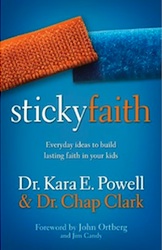“My parents were very religious when I was young. We went to church (or temple or whatever) every week. My parents never, or seldom, prayed or talked about faith at home. As I got older and things got busier, we started attending only at holidays. I do not consider myself religious today.”

This is a good summary of about 80 percent of the personal reflection essays my Intro to World Religions students handed in last week. I asked them to describe their experience with religion to date. I was surprised (and pleased) by their candor. I was surprised that their accounts were so similar. I was surprised, too, by how clear the correlation was between the importance of religion in the parents’ lives over time and the importance of religion in my students’ lives as they enter adulthood.
I know I shouldn’t be surprised. Like everyone else, I’ve heard all about the dismal attrition rates among Christian young people, who are active through their teen years only to leave the church–and very often the faith–when they head to college. And I think deep down we all suspect that parents play an important role in making sure their kids’ develop lasting faith. But I was surprised by how conscious my students–and not just Christian students, but Muslim, Jewish, and Buddhist students–are about the role their parents play in their faith.
This is anecdotal, but I picked up on some patterns. The students whose parents prioritized religious services but didn’t practice religion at home were likely to consider themselves “unreligious” today. Students whose parents emphasized both religious services and devotion at home–even if those practices became less important as the kids got older and schedules busier–were more likely to identify as not practicing but hoping to be more devoted in the future. Students seemed very turned off to religion if their parents are defensive or intimidated about their spiritual questions. By contrast, one student, who is Muslim, said that what keeps him connected to Islam is that his father is willing to discuss his questions. When the father doesn’t have answers, he admits it to his son and they look for answers together. Taken together, this drives home the point that parents are integral to their children’s spiritual lives.
Now, this could be disheartening news. Most parents I know feel ill-equipped for basic parenting without being reminded that they are among the most important factors influencing the future faith of their kids. I would be discouraged, too. But in the same week my students turned in their personal reflections, I received a copy of a new book by Kara Powell and Chap Clark that tackles this issue head on. Sticky Faith, as the subtitle claims, aims to give “everyday ideas to build lasting faith in your kids.” I haven’t read every page yet, but so far I’m really impressed.
The book is based on a large-scale research project Powell oversaw with the Fuller Youth Institute. (Leadershipinterviewed Powell at the beginning of the project in 2009) A series of appendices explain all that. The bulk of the book, though, is dedicated to offering parents and church leaders who work with children and teens wise practical counsel for helping instill in their kids a faith that sticks (hence “sticky”). The writers, both parents, dig deep. They talk about issues as daunting as guiding your child through identity formation, in which discussion they offer advice on helping your child grow through hardship and affirming character growth more than academic (or athletic or whatever other sort of) achievement. In other chapters, they talk about developing relationships, having productive conversations (where they note, not surprisingly, “Christian parents tend to avoid tricky subjects,” but “parents who talk about doubts help build sticky faith”), serving together, and paving the way for the transition to adulthood.
Each chapter begins with findings from the College Transition Project explained in the appendix and tells the stories of real teens interviewed in the process. About half of every chapter gives useful advice–none of it easy, necessarily–for success.
Another thing I found surprising about my students’ papers is that among those who grew up in religious homes, even the ones who no longer consider themselves religious say they plan to take their own children to religious services or make them attend religious school. This, to me, is a great sign. It tells me my students find something valuable in their spiritual heritages that they want to pass on to their kids. A research like Sticky Faith might equip them, and all of us, to be faithful guides in the journey of faith.









